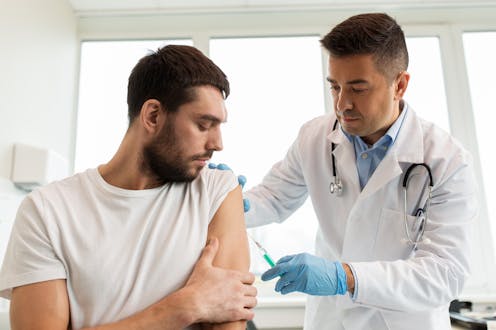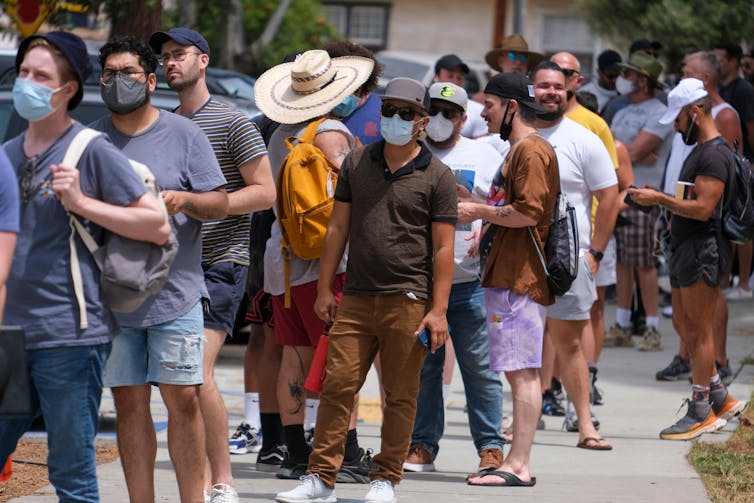
The global outbreak of monkeypox has been going on for nearly five months now. In that time, over 60,000 people have been infected in over 100 countries. Most of the cases have been in young men and the disease has disproportionately affected men who have sex with men.
The outbreak appears to have peaked in mid-August. Since then, the number of cases has been falling steadily. It’s likely that the drop in infections can be attributed to the combined effect of the many public-health measures deployed to combat the virus’s spread.
But while it’s promising to see that case numbers have fallen, monkeypox isn’t likely to go away anytime soon. So it’s important to continue using all the public health measures that have been deployed against it.
One of the main strategies many countries have been using to curb the spread of monkeypox is vaccinating people at high risk of catching the virus and people who have been exposed to the virus. The smallpox vaccine has been used, as the monkeypox virus is closely related to the smallpox virus.
It’s thought the smallpox vaccine offers around 85% protection against monkeypox. However, it’s not certain how effective it is against the current monkeypox strain or how long the vaccine protection lasts.
It will probably stop some monkeypox infections (and it has the added benefit of reducing the severity of symptoms in those already infected). But the recent fall in infections in the UK is probably not due to the vaccine programme alone.
The factor that has probably played a more significant role in the fall in infection numbers is changes in people’s behaviour. A recent US survey of men who have sex with men found that around half had reduced their number of sex partners and avoided one-off sexual encounters. The latter may be significant in reducing case numbers and curbing the spread.
Read more: Monkeypox: an expert explains what gay and bisexual men need to know
A separate US study suggested that having 40% fewer one-off partnerships could result in a 20-31% decrease in infections among men who have sex with men. One-off partnerships lead to around half of daily monkeypox transmission despite only accounting for 3% of daily sexual partnerships and 16% of daily sex acts.
This change in behaviour may, therefore, have had a big effect on delaying the spread of the outbreak. The danger then is what happens when people’s behaviour reverts to what it was before the current outbreak began. This could lead to infection numbers rebounding.

So far, most of the infections have been limited to men who have sex with men. We have not seen much spread to other parts of the population yet, but this could still happen. The possibility of monkeypox spreading further, especially in networks of people with multiple sexual partners, is currently considered to be highly likely. This is why effective public health messaging, early detection, contact tracing, isolation and vaccinations are all essential to keeping the outbreak in check.
And though infections with the current monkeypox variant are generally less severe than with previous outbreaks caused by other variants, that doesn’t mean monkeypox should be treated lightly – especially considering the current variant seems to be more transmissible. Infections have also led to many serious complications, including acute kidney injury and myocarditis (inflammation of the heart muscle), as well as encephalomyelitis (inflammation of the brain and spinal cord). Of the European cases reported, 6% were hospitalised – and of these, a third required treatment from a doctor.
The future of the outbreak
While the number of monkeypox infections appears to be in retreat, globally, it’s not likely to disappear anytime soon. It may fester at low levels in the population and re-emerge intermittently with future outbreaks.
Eliminating monkeypox would require sustained efforts from health authorities and the public to stamp it out over several years. We must be careful not to stigmatise the condition lest we drive it underground and make it more difficult for infected people to seek healthcare.
We should also be mindful that monkeypox continues to circulate in parts of central and west Africa where it has been endemic for years. This year there have been over 500 cases and ten deaths.
These numbers are probably underestimates because of the limitations of disease surveillance in these countries. There remains a risk that monkeypox could be imported from these areas, as has happened in recent years.
Unfortunately, there are a lack of monkeypox vaccination and disease control programmes in Africa. It has also been suggested that the end of smallpox vaccination programmes there before 1980 may have contributed to the resurgence of monkeypox in the years afterwards.
Consequently, if the ultimate aim is to eradicate the threat of monkeypox, far greater disease prevention and control measures will be needed in countries where the disease is endemic.
Andrew Lee has previously received research funding from the National Institute for Health Research. He is a member of the UK Faculty of Public Health and the Royal Society for Public Health.
This article was originally published on The Conversation. Read the original article.







